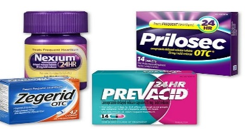Proton Pump Inhibitors. Should we be taking them long-term?
Since the development of Proton Pump Inhibitors (PPIs) in 1989, they have become the primary treatment for acid-related disorders but may not be good to use for long-term use. The stomach is normally an acidic environment, and the normal Ph in the stomach is between 1.5- 2.0. This acidic environment allows for the digestion of certain nutrients and kills organisms that are not supposed to get into the intestines. PPIs also decrease the diversity of the bacteria in the gut which may lead to leaky gut. As of May 2023, there were 12,949 active PPI lawsuits pending in federal court blaming some PPI drug manufacturers from failing to warn users of the potential complications of taking PPIs. Many of the allegations claim that PPI’s caused kidney damage.
Although, patients are placed on a PPI for its benefit to managing acid-related diseases, there are drawbacks as well. PPIs change the normal functioning of the body by reducing the amount of hydrochloric acid we should have in our stomach. With long-term use this can lead to a decrease in calcium absorption and bone strengthening leading to an increased risk of osteoporosis. Long-term use can also lead to a decrease in very important vitamins and minerals including vitamin B12 and magnesium. Finally, long term use can cause intestinal infections such as C-diff, leading to severe diarrhea. A 2013 study showed people who took PPIs for more than 2 years were 65% more likely to have a B12 deficiency. Other studies have shown that taking PPIs for more than a year may lead to low magnesium levels and low stomach acid has shown to cause iron deficiencies.
If you are currently taking a PPI to manage an acid-related disorder, do not stop taking it without first consulting with your medical provider, but remember there are many things you can do to improve your acid related disorder and PPIs do not fix the problem: eat small meals, eat slowly and mindfully, track your trigger foods and avoid them, avoid carbonated beverages, avoid late night eating, weight loss, relaxation techniques, and reduce alcohol. We at Gut Instinct can work with you on improving your digestion so PPI medication is no longer needed by guiding you to eating a more whole foods diet to strengthen your digestion, help you identify your trigger foods, and teach you methods to manage your stress and improve sleep.
References
2. https://badgut.org/information-centre/a-z-digestive-topics/managing-gerd-ppis/
4. Tran-Duy A, Connell NJ, Vanmolkot FH, et al. Use of proton pump inhibitors and risk of iron deficiency: a population-based case-control study. Journal of Internal Medicine. 2018;285(2):205-214. doi:https://doi.org/10.1111/joim.12826



No comments:
Post a Comment